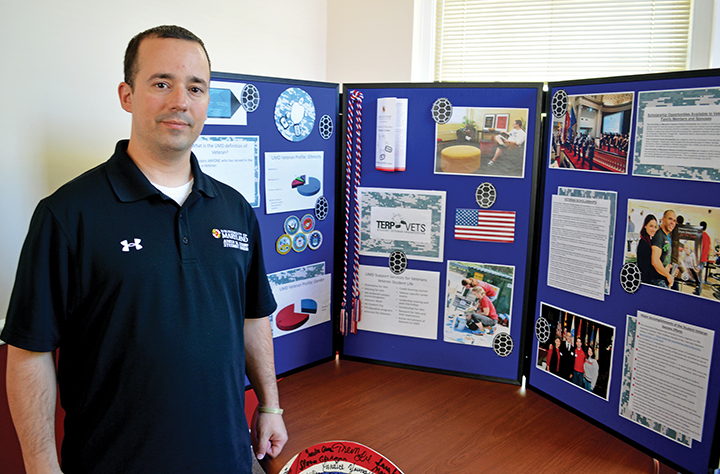
Brian Bertges, a U.S. Army veteran, Penn State alumnus and this university’s veteran student life coordinator, says his position combines his passion about education and veterans.
On Sept. 11, 2001, Brian Bertges was settling into his first semester back at college following a four-year stint as a U.S. Army combat medic. The towers crashed down, the nation changed and Bertges waited for a phone call.
On inactive reserve at the time, Bertges, who became veteran student life coordinator at this university this summer, said he anticipated getting called back into service.
“I was more than willing to go back, but I had just gotten out of the military,” Bertges said. “So I said, ‘If they call me, they call me. If they don’t, I’m gonna get my education.’”
Ultimately, Bertges was not called to duty, but the absence of that phone call gave him the chance to dive into campus life at Penn State. And that, he said, is an opportunity he would like to extend to veterans at this university.
“Coming back from my service, that was one of the things I was most worried about: ‘Will I fit in?’” he said.
Bertges found a home on the Penn State campus with the Theta Delta Chi fraternity. In addition to serving in the Army as a noncommissioned officer, Bertges was president of Penn State’s InterFraternity Council, worked for Teach for America for four years and worked with the American Legion on veterans’ benefits.
What really allowed him to enjoy his college experience, he said, was not just academics, but also getting involved, which he believes is true for all veteran students.
“I’m very passionate about education, and I’m very passionate about veterans,” Bertges said. “You put them together, and you get my job.”
In his brief time as veteran student life coordinator, Bertges has focused on student groups and helped students as individuals, said Alex Nielson, treasurer of Terp Vets. Bertges helped Nielson fix miscommunications regarding his scholarship by arguing on Nielson’s behalf with the bursar’s office.
“It makes a huge difference being able to work with someone who intimately understands what we’re trying to do [in TerpVets] and who really gets what we as veterans are going through,” said Nielson, a senior biology major.
Bertges’ ultimate goal is to make the university a top school for veterans nationally and even globally.
“I really think the university can achieve that, and we’re going to work towards it relentlessly,” he said. “I want veterans to not only feel comfortable transitioning into the school environment, but I want them to transfer into a career and be 100 percent ready.”
Bertges plans to focus on creating dialogue with veterans, his first order of business when he assumed the position this summer. Bertges, along with the team of coordinators, worked to revamp this semester’s new veteran student orientation, making a concerted effort to push veteran student involvement with the community.
“Brian really talks to the students; it’s just the way he is. He asks them what they’d like to see, what they’re looking for,” said Joe Alemany, graduate coordinator of veteran student life and a second-year doctoral student studying public health. “He’s actually making strides, putting himself out there to the people he’s serving.”
Though Bertges once dreamed of becoming a neurosurgeon, he said he eventually realized it wasn’t necessarily being a doctor that he was interested in. It was helping people and living a life dedicated to servant leadership — something he continues to do at this university, one step at a time.
“We as people can really change each others’ lives, and even now, being here in the college community, you can impact any person on campus in a positive way,” Bertges said.
“It’s not easy to go out of your way to help somebody, but if you make that difference in somebody’s life, you may not know it, but they’ll thank you for the rest of their lives.”



